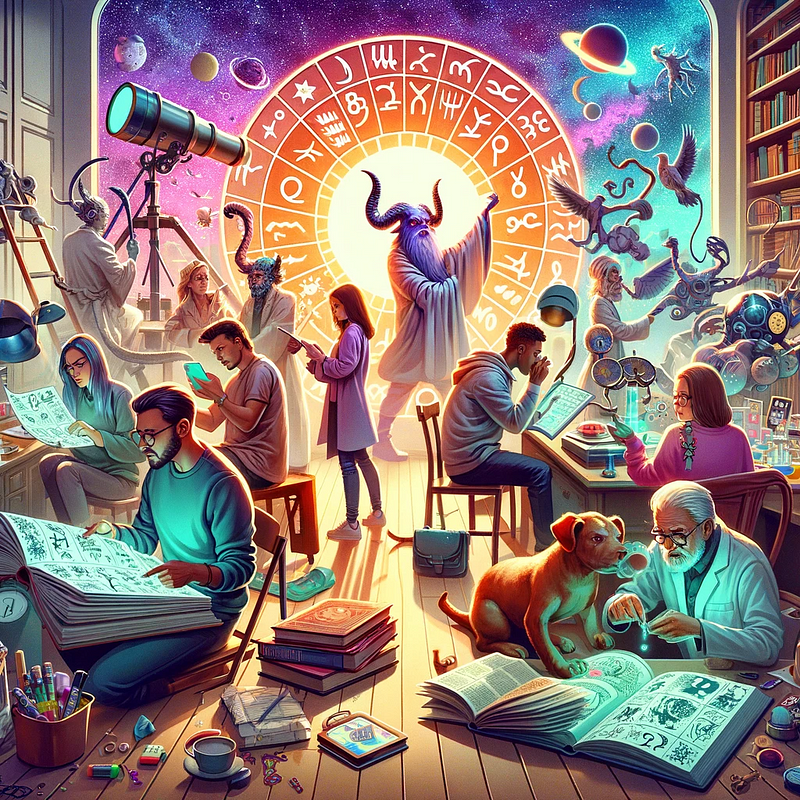Astrology's Resurgence: Culture, Science, and Modern Beliefs
Written on
Chapter 1: The Astrology Phenomenon
Astrology, a practice rooted in antiquity, is experiencing a significant revival in our contemporary digital landscape. The industry's value is projected to soar from $12.8 billion in 2021 to an astounding $22.8 billion by 2031. This surge signifies more than just a passing fad; it represents a cultural shift that merges age-old practices with the fast-paced world of modern technology — from AI-generated horoscopes to vibrant discussions on social media platforms.
Astrology's Digital Transformation
The transition of astrology from obscure newspaper sections to a prominent role in digital innovation is noteworthy. We are witnessing a blend of traditional practices with cutting-edge technology — featuring zodiac apps, podcasts, and AI that rejuvenates ancient star charts. But what drives this transformation? Is it a simple escape from reality, a quest for deeper meaning, or perhaps a combination of both?
A Scientific Perspective on Astrology
Despite its growing acceptance, astrology's foundation in scientific credibility is tenuous. For example, Shawn Carlson's groundbreaking research demonstrated that astrological predictions are no more accurate than random guessing. This study employed stringent double-blind methods to test astrology's claims, ultimately revealing its foundations to be unsound. Additionally, the absence of a viable explanation for how celestial bodies billions of miles away might influence our daily experiences remains a critical vulnerability for astrology in the scientific arena.
Astrology and Cultural Identity
The fascination with astrology, particularly among younger individuals, appears to be closely linked to their quest for identity and guidance in an increasingly intricate world. As traditional institutions and religions wane, astrology offers a personalized narrative for each seeker. It transcends mere future predictions, serving as a medium for individuals to connect their personal journeys with the cosmos. However, this shift raises questions about whether astrology serves as harmless entertainment or as a substitute for critical thought.
Astrology vs. Science: A Cosmic Conflict
The divide between astrology and science is stark. Astrology's concepts, rooted in pre-scientific traditions, stand in sharp contrast to the empirical methodologies of modern science. This disparity prompts important reflections on how we discern truth in the digital age, where facts and misinformation are in constant interplay.
Critical Thinking Amidst Astrological Allure
As we explore our inner selves, does astrology provide an easy answer that undermines critical thinking? The challenge lies in harmonizing our captivation with celestial phenomena while maintaining a grounded approach to the complexities of life. It invites us to cultivate a curious, questioning mindset, even as we delve into the mystique of astrology.
Further Exploration and Acknowledgments
For those interested in a deeper examination of astrology's scientific critiques, "Your Horoscope is Trash" by Dustin Arand is a must-read. Arand's article rigorously investigates the skepticism surrounding astrology, offering a thought-provoking perspective on this time-honored practice.
The video "The Modern Astrology Obsession, Explained" further elaborates on this phenomenon, discussing the implications of astrology's rise in contemporary society.
Astrology's Role in Modern Spirituality
Arand's article, published in ILLUMINATION, highlights the increasing prevalence of astrology apps, podcasts, and columns, noting that the industry's value has surged from $2 billion in 2018 to a projected $23 billion by 2031. Coming from a background rich in science and religion, Arand expresses concern regarding the growing acceptance of astrology, especially among younger Americans.
The article raises significant questions about astrology's validity, citing research where astrologers were unable to accurately predict personality traits or life events based on astrological charts. Arand argues that the principles of astrology are fundamentally flawed, relying on outdated and arbitrary classifications of stars and constellations. He illustrates this with the shifting nature of zodiac signs due to Earth's axial wobble and the arbitrary characteristics of constellations, emphasizing astrology's lack of scientific basis.
Moreover, Arand critiques the certification processes for astrologers, questioning whether they truly reflect expertise or simply serve as barriers to entry in the market. He notes that the complexity of terminology often obscures a lack of meaningful content, a phenomenon he refers to as the "guru effect."
The article also speculates that astrology's rise may correlate with the decline of organized religion and the emergence of alternative spiritual practices. Modern astrology is seen as a form of accessible and affordable counseling, particularly attractive to younger generations compared to traditional therapy.
Ultimately, Arand argues that astrology's increasing popularity, fueled by the internet and social media, poses challenges as it promotes a disregard for critical thinking. He concludes by contrasting the deceptive allure of astrology with the profound insights offered by science, referencing Carl Sagan and Bill Nye to highlight our genuine connection to the cosmos through scientific inquiry rather than pseudoscientific beliefs.
